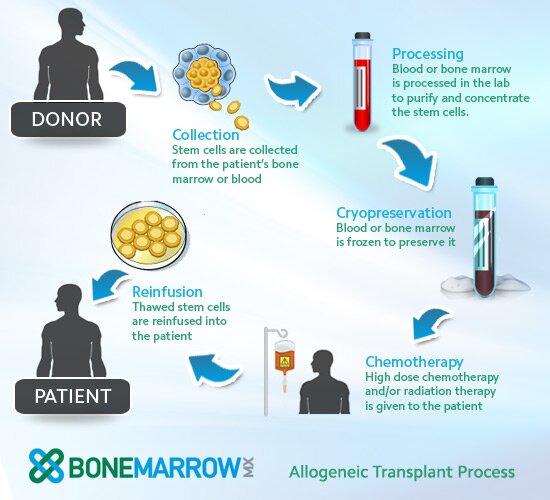
Transplanting Donor Stem Cells
If a person’s bone marrow has been affected by a disease, such as leukemia or sickle cell anemia, bone marrow transplant can cure the disease by replacing the diseased marrow of the patient with the healthy marrow of the donor.

Allogenic Bone Marrow Transplant
An Allogeneic bone marrow or stem cell transplant is one where cells from a donor are introduced to the patient in order for the new, donated cells, to reproduce, enabling the patient to recover healthy bone marrow and healthy blood. The donated cells can come from a relative, sibling or an unrelated donor (this includes umbilical cord blood) who is a close genetic match to the recipient.
In cases where the donor is the identical twin of the patient, the transplant is essentially like an autologous transplant, as the cells are genetically identical. Although close matches in cord blood transplants are preferred, they are not as important as the risks of Graft Versus Host Disease are much lower with cord blood transplants (although the risk of infection is higher).
The Matching Process
Our team of bone marrow experts will advise you if allogeneic transplant is the best option for you, we will begin the process of finding a match. A match is found by doing human leukocyte antigen (HLA) testing. Your HLA type for a stem cell transplant is determined by 8 factors, 4 that are maternal (inherited from the mother) and 4 that are paternal (inherited from the father). Usually doctors will check for a match in family members before accessing donor registers; there is a 30 % chance that a sibling or family member is a match.
A complete suitable match will have 6 or more out of the 8 antigens the same, although the better the match the greater chance of the donated cells taking properly in the patient’s body without rejection. As there is only a 30% chance of a family member being a match, volunteer donor registers and umbilical cord banks are essential sources for finding matching cells.
The Advantages of Allogeneic Stem Cell Transplants
- After a successful transplant you will have a whole new immune system. This means that, should your disease come back for some reason, you can be given a boost of donor cells to help your body to fight the disease or disorder.
- Mature donated adult stem cells engraft more quickly. This means that you are at high risk of infection for a shorter period of time than a cord blood transplant.
For information about how we harvest stem cells for an allogeneic transplant click here.